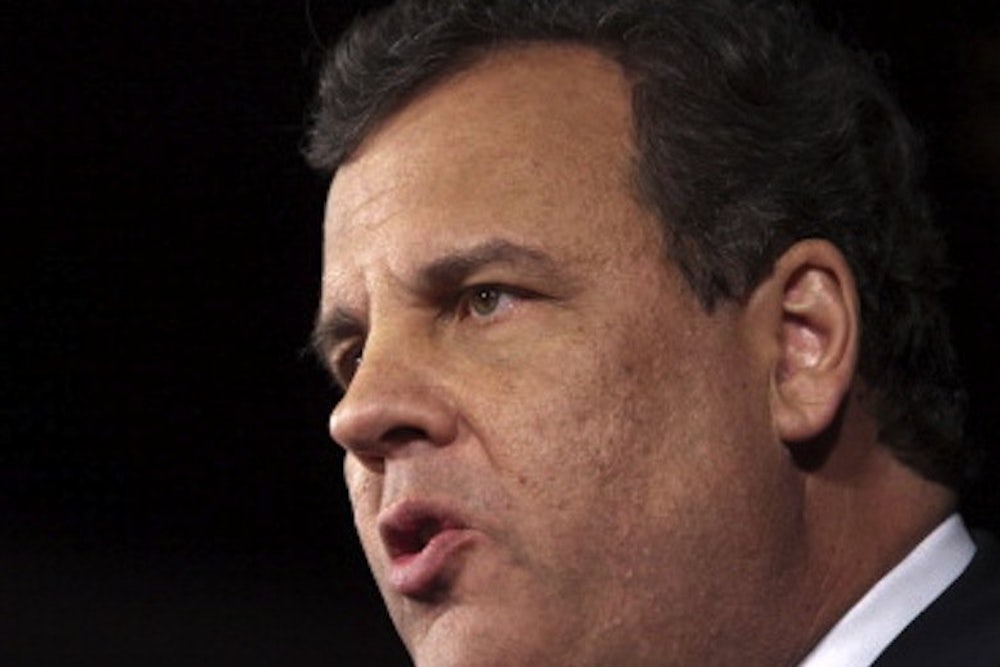The question of the day, at least in the political/media world, is whether Chris Christie is another Rudy Giuliani, i.e. another brash northeasterner who will flame out in the Republican presidential primaries. Maggie Haberman, over at Politco, lays out the similarities and differences between the New Jersey governor and, er, America's Mayor. Meanwhile Ross Douthat, in his Sunday New York Times column, urges Christie to avoid Giuliani's mistakes. If there's one thing to take away from these comparisons, it's this: despite his moderate reputation, Giuliani would have made an absolutely disastrous president. Christie, who is considered the relative moderate of the 2016 field, would too.
To greatly simplify the most complex job in the world, it can be helpful to divide the president's responsibilities into three different categories. The first is fiscal policy, and issues regarding the safety net. The second is social policy. And the third is foreign policy. Both Christie and Giuliani have strong reputations as fiscal conservatives: Giuliani put particular stress on this aspect of his record in 2008, and ran on a very conservative tax plan. Christie is sure to make cutting taxes and government (and taking on organized labor) the central focus of any national campaign.
In terms of social policy, Giuliani was a liberal, pro-choice Republican. Christie opposes gay marriage and abortion rights, but he seems uninterested in focusing on social issues, and he has both signed a ban on so-called "gay-conversion therapy," and ended a challenge to a court decision allowing gay marriages in New Jersey. He is sure to be seen as the least socially conservative of the plausible GOP nominees.
This leaves foreign policy. Giuliani ran on a platform of, essentially, aggressiveness. Christie, at least if his back-and-forths with Rand Paul are anything to go by, has similar plans. He will almost certainly call for increased defense spending, and a more aggressive posture in the world. It's difficult to guess how presidents will act abroad if all you have to go by are campaign statements. (George W. Bush is the shining example of this). But temperament is clearly important. Here's Haberman on that:
In 2009, he told his campaign rival to “man up and say I’m fat.” Since then, he’s become a YouTube video waiting to be made, dressing down constituents at town halls one day and exploding at critics the next, in the blunt-spoken style that’s made him one of his party’s best-known figures. It’s all reminiscent of Giuliani, who years earlier regularly sparred with reporters or callers on his weekly radio show. Audio of those shows played during his presidential run painted a less-than-leaderly picture of the man who early in his mayoralty famously said his city could “kick your city’s ass” and went on to gain hero status after Sep. 11, 2001.
And here's Douthat, addressing Christie:
But what felled Giuliani in 2008 wasn’t just “values” issues. It was the former mayor’s apparent belief that being a national hero was a sufficient qualification to be president — that he could just show up, be “Rudy,” and the rest would take care of itself. As another charismatic politician defined by your handling of a catastrophe, you’re vulnerable to the same temptation: the belief that you, personally, are the solution to the Republican Party’s many problems, and that you can just run on your own awesomeness without specifying where you would take the country if you won. That act wears thin in a long campaign, and it’s likely to wear especially thin in a party that needs a new agenda as badly as Republicans do today.
This excerpt isn't enitrely about foreign policy, but Christie and Giuliani are both men with big egos, and little patience for nuance. Both have a tendency to call upon emotional reactions to 9/11 as guides to how Americans should act in the world. Both have tight inner circles, and Christie has a reputation for secrecy. (Christie presiding over the NSA is not a heartwarming picture). Neither one has much, if any direct experience with actual foreign policy (although Giuliani enjoys advising foreign thugs).
So why is this particular brew so potentially dangerous? Presidents have a tremendous impact on fiscal policy and foreign affairs. (Indeed, they sometimes seem like the only Washington foreign policy actor). As for social issues: No president is going to be signing abortion or gay marriage bans anytime soon. The crucial aspects of social policy, at the federal level, are decided by judges and executive appointments. There is no reason to think Christie's (or Giuliani's, if he had won) appointments would be different from any other Republican's. Judicial and executive branch appointments are extremely important to the Republican base; in fact, one could argue that a more moderate Republican would feel the need to pay off his or her base by nominating especially conservative judges and cabinet members. Christie's relative social moderation is basically irrelevant. And the things that moderates like about Christie--such as his willingness to treat the president as legitimate, and his constant talk of bipartisanship--are unlikely to matter if he takes higher office
All the way back in 2000, liberals were fretting that George W. Bush would turn the country into a "theocracy." It didn't happen, to say the least. But Bush did preside over disastrous foreign and fiscal policy. Christie is a threat to do the same. When it comes to the presidency, I'd much prefer a more socially conservative Republican who had more liberal views on fiscal policy. (Douthat, as his column shows, is still pining for one). Unfortunately, it isn't clear any exist. But don't be fooled: Christie may end up being a liberal nightmare.
